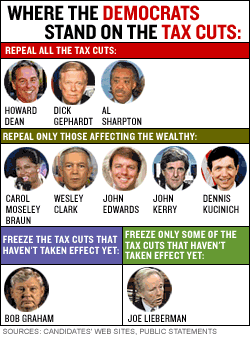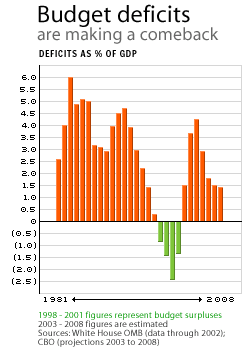NEW YORK (CNN/Money) -
Expect all of the Democratic presidential candidates debating Thursday to call for a repeal of some or all of the tax cuts enacted by the Bush administration, arguing that will help fend off crippling budget deficits that could threaten the world's largest economy.
But some economists have warned it's just not that simple.
At the urging of President Bush, Congress has passed tax cuts in each of the past three years that, combined with a recession, a bear market in stocks, terrorist attacks and wars, helped to turn a $127 billion budget surplus in 2001 into a projected budget deficit of more than $400 billion in the fiscal 2003, which ends Sept. 30.

Bush and his fellow Republicans say the cuts have supported consumer spending during the long jobless recovery that has followed the 2001 recession, and promise the cuts will ultimately help create jobs.
Democrats, on the other hand -- including the 10 vying to take Bush's job in 2004 -- say the tax cuts have helped few but the wealthiest Americans, while ruining the federal budget and setting the stage for a far worse fiscal crisis in the future.
"The core part of President Bush's solution to create jobs is a tax cut for the wealthy – but such tax cuts increase the deficit, while offering little economic stimulus," says the Web site for the current Democratic front-runner, retired general Wesley Clark. This week, Clark unveiled a plan to roll back $100 billion in tax cuts for families making more than $200,000 a year and give the money to state and local governments, tax breaks for businesses, and spending on homeland security.
"General Clark's plan is a more direct way to create jobs – and thus, it provides more bang for the buck than any plan put forward by President Bush," Clark's Web site says.
Most of the other candidates also favor rolling back or freezing tax cuts for the wealthy. Former Vermont Gov. Howard Dean, Rep. Richard Gephardt of Missouri and Al Sharpton have said they want to completely repeal the Bush tax cuts.
The idea of at least rolling back cuts for the wealthy -- who will get most of the tax-cut benefit by 2005 -- seems to be gaining in political popularity. An NBC/Wall Street Journal poll released Thursday showed 56 percent of respondents suggested paying for Iraq's reconstruction by canceling tax cuts for the wealthy.
Many economists said the question of whether repealing some or all of the tax cuts will help the economy depends largely on where the economy stands by 2005, when one of these candidates would take office.
"By 2005, I expect the economy will be stronger, more fully utilized" but still not up to full strength, said Citigroup senior economist Steven Wieting, who warned that any projection about the budget and its economic impact can't possibly account for unpredictable changes in discretionary and military spending.
"Under those circumstances, my guess is that a full repeal of the tax cuts would be negative," he said.
Wieting and some other economists worry that rolling back tax cuts, even if only for the wealthiest Americans, could have a negative impact on stock prices, business investment and hiring.
"Like it or not, rich people are the ones who save and invest. If you give people who accumulate capital a tax cut and take it back, you send the message that they can't trust the government," said Rajeev Dhawan, director of the Economic Forecasting Center at Georgia State University in Atlanta. "That's not good for capital accumulation, which is needed for investment in the long run."
1993 all over again?
If, on the other hand, the economy is roaring by 2005, some economists believe it might be strong enough to absorb rolling back tax cuts. Some note that a tax hike in 1993 didn't sink the economy, as many Republicans thought it would.

"In 1993 we had an economy coming out of recession, we had unsustainable budget deficits in the projections and we had a budget package which people were afraid would dampen the recovery -- but it didn't," said Max Sawicky, economist at the Economic Policy Institute, a liberal think tank in Washington, D.C. "It had the opposite effect. It wasn't huge, but it was in the right direction, which was the key thing."
In fact, Sawicky and other economists think there's a downside to not rolling back the tax cuts when the economy is strong: higher interest rates.
If the government still is running big budget deficits when businesses are trying to borrow money to expand, then companies could find themselves competing for funds with Washington, an effect economists call "crowding out."
| Related stories
|

|
|
|
|
According to a Federal Reserve study in May, interest rates could rise a quarter percentage point for every projected one-point increase in the ratio of the federal deficit to gross domestic product. A big jump in interest rates would put the brakes on the economy by raising the cost of borrowing.
The "crowding out" theory is disputed by many Republicans, some of whom argue that tax cuts will make the economy grow so much that it will boost tax revenue enough to balance the budget. But this "supply side" theory has plenty of critics, too, some of whom doubt tax cuts will be drastic enough to have much stimulative impact.
"I don't buy into those supply-side, trickle-down ideas," said Mark Zandi, chief economist at Economy.com. "Those arguments might have made some sense 25 years ago, when the top tax rate was 70 percent, but not today, when the top rate is half of that."
Any negative effects of repealing tax cuts could be offset, Zandi and some other economists said, by returning some of the money to the economy in other ways. Sen. John Edwards of North Carolina, for example, has proposed making the middle-class tax cuts permanent and offering an "energy tax credit" of $500 per family.
"It's entirely possible you could repeal tax cuts without injuring the economy if you did it carefully, over a period of time, while offsetting it in part by increasing expenditures you knew were coming anyway or thought desirable," said former Fed economist Lyle Gramley, now a consulting economist with Schwab Washington Research. "But you couldn't simply remove the tax cuts altogether right away and avoid significant negative effects to the economy."

|

